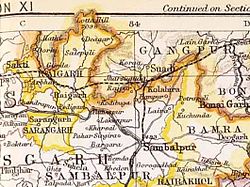Sarangarh State
| Sarangarh State सारंगढ़ रियासत |
|||||
| Princely State of British India | |||||
|
|||||
|
Flag |
|||||
| Sarangarh State in the Imperial Gazetteer of India | |||||
| History | |||||
| • | Established | 91 | |||
| • | Independence of India | 1948 | |||
| Area | |||||
| • | 1901 | 1,399 km2(540 sq mi) | |||
| Population | |||||
| • | 1901 | 79,900 | |||
| Density | 57.1 /km2 (147.9 /sq mi) | ||||
Flag
Sarangarh was a princely state in India during the British Raj ruled by a Raj Gond dynasty. The emblem of the state was a turtle.
Its capital was in Sarangarh town, now in Chhattisgarh state. The state had no significant towns except for its capital. Its area was 1,399 square km with a population of 79,900 persons according to the 1901 census.
According to legend Sarangarh state was founded in the first century AD by Gond ancestors that had migrated from Bhandara. It was originally a dependency of the Ratanpur Kingdom and later became one of the eighteen Garhjat states under Sambalpur State The Sambalpur kings favoured Sarangarh owing to its readiness to help their kingdom during military campaigns.
In 1818 Sarangarh became a British protectorate. Between 1878 and 1889 Sarangarh state was placed under the direct administration of British India owing to economic mismanagement and the infancy of the ruler Bhawani Pratap Singh. On 1 January 1948 Sarangarh State acceded to the Indian Union.
Sarangarh State was one of several princely states governed by the Raj Gond dynasty of Rajputs. The rulers bore the title 'Raja'
Coordinates: 21°36′N 83°05′E / 21.6°N 83.08°E
...
Wikipedia


